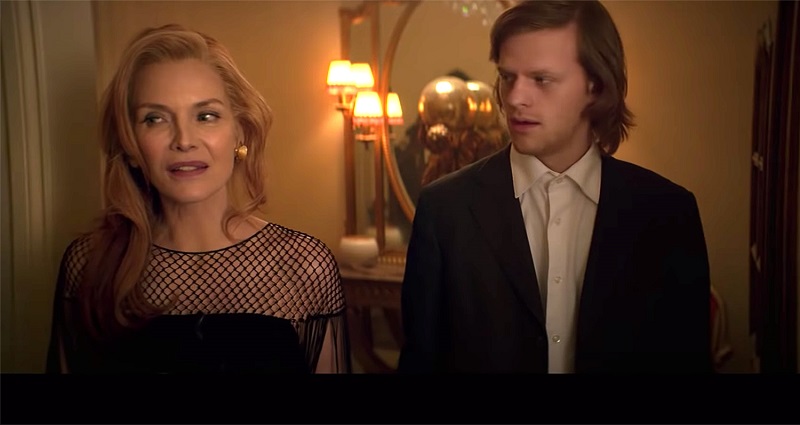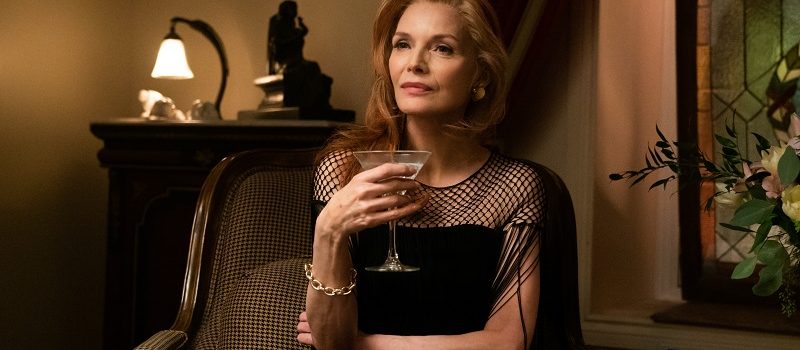There is something about Michelle Pfeiffer, especially when she tackles fierce and commanding characters. That is exactly what she has done with her latest, French Exit. Whether it Catwoman in Batman Returns or the titular character in Frankie and Johnny, right on through Queen Ingrith in Maleficent: Mistress of Evil, Pfeiffer inhabiting a woman with her back to the wall resonates and is riveting.

That is exactly what we have in her latest, which is based on the book French Exit by Patrick DeWitt (he also adapted the screenplay). She is Frances Price, a wealthy widow who we meet years prior taking her 12-year-old son Malcolm Price (who grows up to be Lucas Hedges) out of his boarding school for no other reason than she felt it was time to be “mom.” Or simply, she was lonely.
Immediately, we flash forward to the present day where Malcolm is still living in the palatial New York City home with his mother. Father has long since died, and it’s been just Malcolm and Frances for years… that and their cat. Due to her deceased husband’s financial trust complications, Frances will be cut off from all monies and property within 30 days. After spending decades as a New York socialite and living a lifestyle that is luxurious—to put it mildly.
What’s a woman to do?
How about taking all the money she can scrape up, Malcolm in tow, and head to a friend’s apartment in Paris with the intention of living life until the money (which she has in cash) runs out. Along the way, she and her son make unlikely acquaintances including a fellow ex-pat widow, who goes by the name of Madame Reynard (Valerie Mahaffey), Julius (Isaach De Bankolé), a Parisian private detective, and even a gifted psychic, Madeleine the Medium (Danielle Macdonald)—who Malcolm met on the luxury liner they took from Manhattan to the French capital.
In French Exit, director Azazel Jacobs has painted a landscape that is uniquely and unequivocally his. Audiences have experienced New York City and Paris on the big screen in a million ways. The difference here is the filmmaker has made both cities seen through the periscope that is the unique relationship and lifestyle, fashion choices, and interests of the Prices. This is established through his fantastical choice of a production designer in Jean-Andre Carriere and cinematographer with Tobias Datum, as well as the prose that is emitted from every single character on both sides of the pond—thanks to DeWitt’s wicked sense of humor and piercing commentary on a myriad of issues.

The relationship between Malcolm and his mother is also unlike any seen on the screen in recent memory. They enjoy each other’s company. But there is something about Frances that has a hold over her son that is unspoken but achieved through the seemingly smallest touches. For example, her son is terrified to tell her that he got engaged to Imogen Poots’ Susan, back in Manhattan. In the few scenes they share together in the first act, Poots and Hedges have fantastic chemistry, but she knows exactly what she is getting involved with when it comes to her beau and his maternal influence. How that plot point—and everything and everyone else that has become sucked into the gravitational pull of Frances and Malcolm’s world for that matter—is laid out over the course of Jacob’s film in a manner that is thoroughly enjoyable.
The film is equally comedic and dramatic. It hits both of those notes in ways that are pitch-perfect in terms of the ebbs and flow of the overall narrative. Sometimes a filmmaker and a wordsmith join forces and the result far exceed expectations. That is firmly the case with French Exit. Not every storyteller can take the world described above and insert a séance that involves a dead husband and a missing cat and not have the entire film go off its firmly established rails with its most surprising outcomes.

A director once informed me that 90-percent of the job well boils down to casting and employing behind-the-camera talent. Clearly, that is the case here. The entire thing doesn’t work without that relationship at the center of the tale possessing the power that Pfeiffer and Hedges deliver. The actress deserves to be in the discussion for Best Actress Oscar, while her co-star deserves to be in the Supporting Actor discussion.
Hedges is on one incredible hot streak. Then again, the kid’s talent is so immense that doing Academy Award-worthy work is simply how things are with the young actor. He’s already got one nomination (Manchester by the Sea). In the last couple of years alone, Hedges has shared the screen with Meryl Streep (Let Them All Talk), Frances McDormand (Three Billboards), and now Pfeiffer. He dazzled in 2019’s Honey Boy, Waves and 2018’s Ben is Back and Boy Erased. With French Exit, he adds a role to his resume that requires the thespian to be quietly nuanced by keeping his character’s characteristics close to the vest. It is some incredibly stunning work.

Then, there’s his onscreen mother. Pfeiffer turns in a performance that is intensely ferocious. Her Frances is a character that is seemingly as self-centered, jaded, and cold as they come. Yet we adore her and can’t get enough of her trials and tribulations. The actress portrays her as deeply grounded, especially when it comes to possessing the most humane of personal ailments—feeling lost. There’s layered, and then there’s what Pfeiffer delivers. Frances is a complicated soul. On the outside, she seems as if she couldn’t be more materialistic and driven by financial excess and security. Yet as the tiers to her persona are unveiled, the soul of the character emerges. In the hands of Pfeiffer, it is a reveal and a journey that is electrically entertaining.
Grade: A-
French Exit is being released solely in theaters, but look for it to be streaming in the near future.

